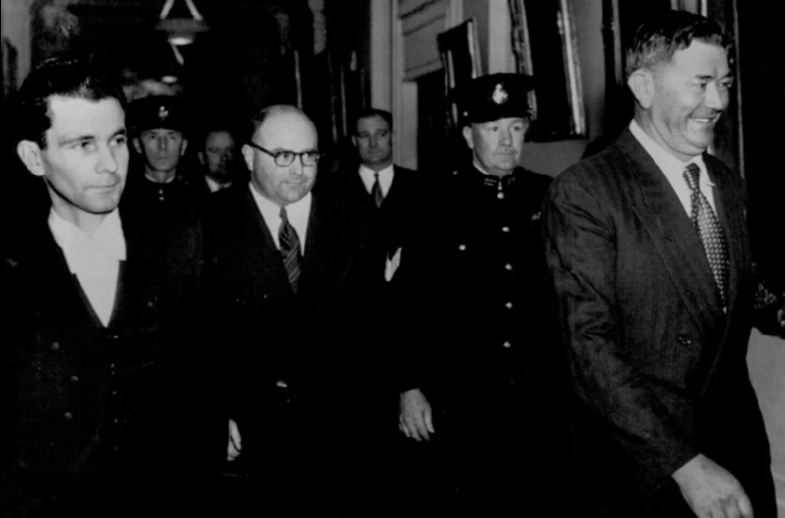On this day, 10 June 1955, on a motion from Robert Menzies the House of Representatives votes to imprison Frank Browne and Raymond Fitzpatrick for 90 days for breaching parliamentary privilege. The incident remains a constitutional and political oddity, raising questions of free speech, due process, and the fairness of ‘trial by politician’. Gavin Souter has suggested that it ‘was rather as if the House had been annoyed by two blow-flies, and used its new Mace to swat them’.
The basis of the conviction was Section 49 of the Australian Constitution, which states that the powers and privileges held by the British Parliament in 1901 are replicated in Australia. Many of these powers and privileges are of some antiquity, including article 8 of the 1689 Bill of Rights which states that freedom of speech in Parliament ‘ought not to be impeached or questioned in any court or place out of Parliament’.
The subject at issue was an article published in the free weekly newspaper the Bankstown Observer on 28 April 1955 attacking the Labor Member for Reid, Charles Morgan. It alleged that Morgan had been involved in a series of ‘immigration rackets’ offering guaranteed entry into the country in return for payment while working as an immigration agent – a job he had engaged in twenty years prior, yet which the article made out to be a contemporary role.
The Observer was owned by Fitzpatrick, who has been described as something of a gangster who used wealth and intimidation to exert a corrupt influence in Bankstown, a suburb that was undergoing a rapid immigration-driven expansion at this time. Fitzpatrick and Morgan had a long history of run ins, which included the former inducing firebrand Jack Lang to run for the seat of Reid in 1946. They had subsequently come to something of a truce, which came to an abrupt end with the burning down of the premises of Bankstown’s rival newspaper the Torch, an act which compelled Morgan to denounce Fitzpatrick in the Federal Parliament. In response Fitzpatrick hired Browne, a scandalous journalist known to ASIO for engaging in blackmail, to start writing hit pieces about Bankstown’s federal member.
While the 28 April article would normally be grounds for a defamation case, in these bizarre circumstance Morgan instead decided to pursue the issue as a matter of parliamentary privilege, on the basis that the article represented an act of intimidation designed to inhibit his ability to act as a Member of Parliament. On 3 May Morgan brought up the article in the House of Representatives, claiming that it had impugned his personal honour and challenged his fitness to be a representative. He subsequently requested that the article be referred to the House’s Privileges Committee.
The House agreed and over the ensuing weeks the Committee met on a number of occasions to deal with the matter, with Morgan, Fitzpatrick and Browne appearing before it to be questioned by its members. The Committee report, presented to the House of Representatives on 8 June 1955, concluded that a breach of privilege had occurred and recommended that the House take appropriate action. The House determined that Fitzpatrick and Browne be required to appear before the Bar of the Chamber to face punishment.
On 10 June 1955, the honourable members decided by a margin of 55 to 11 (in the case of Browne) and 55 to 12 in the case of Fitzpatrick to commit the ‘Bankstown Two’ to three months in gaol. Labor members were divided by the issue, with many preferring the milder imposition of a fine and choosing to abstain without this option, but Gough Whitlam was one of a handful of Labor men who voted in favour. Menzies made an impassioned statement that Parliament was ‘the flower of Australian democracy, and the degree to which this House preserves the freedom of its members to speak and to think will be the measure of its service to democracy’
Subsequent appeals to the High Court of Australia and the Privy Council were unsuccessful, and the defendants served their full sentences in the Canberra police lock-up (while appeals were pending) and Goulburn Gaol.
The incident has long been one of great controversy. Certainly, it was without precedent in Australian political history and it has not been repeated since. The Clerk of the House of Representatives Frank Green had advised that there had been no breach of privilege and would ultimately resign over the decision. He would later allege that Menzies was out to get revenge on Browne for an article he had written calling Menzies a coward for not serving in the First World War. However, more recently Former Senate Clerk Harry Evans has defended the decision, describing Menzies and Opposition Leader H.V. Evatt as ‘eminent constitutionalists’ who felt justified in defending the sanctity of Parliament.
Andrew Moore argues that the truth lies somewhere in the middle of the clerks’ opinions. The honourable members judging Browne and Fitzpatrick were hardly impartial jurors, but it was not as if Menzies was alone in having animosity towards Browne and it is difficult to believe that he was the driving force behind the proceedings. The privilege issue was thought up by Morgan and he should bear responsibility for it, as should the 55 Members of Parliament who agreed with him.
Further Reading:
Andrew Moore, ‘Fitzpatrick and Browne after 60 Years’, paper presented as a lecture in the Senate Occasional Lecture Series at Parliament House, Canberra, 29 May 2015, Fitzpatrick and Browne after 60 Years – Parliament of Australia (aph.gov.au)
Harry Evans, ‘Fitzpatrick and Browne: imprisonment by a house of the parliament’, Papers on Parliament, no. 52, December 2009.
Frank C. Green, Servant of the House, Heinemann, Melbourne, 1969
Sign up to our newsletter
Sign up for our monthly newsletter to hear the latest news and receive information about upcoming events.


